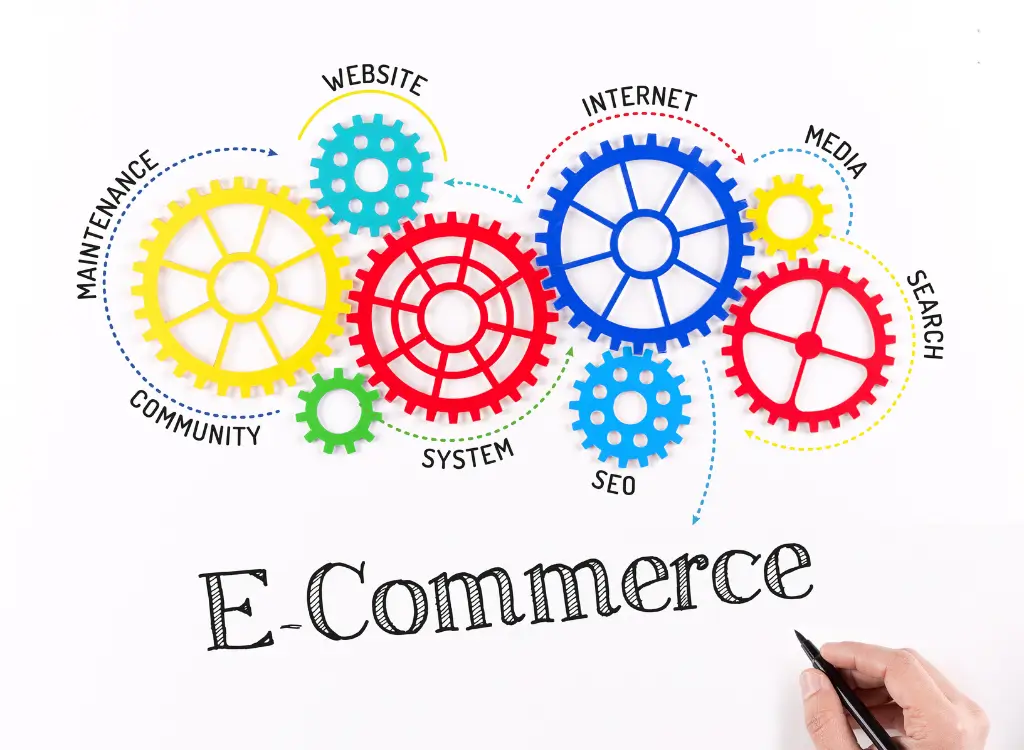Page Contents
ToggleIn the competitive world of online retail, simply having a great product is not enough. If customers can’t find your store, your sales will suffer.
This is where e-commerce SEO becomes a game-changer. It’s the process of making your online store more visible on search engine results pages, driving organic traffic, and ultimately, boosting conversions.
But SEO is constantly changing. The growing role of artificial intelligence (AI) is transforming how search engines work and how businesses need to approach their optimization strategies. This guide will walk you through the essential e-commerce SEO strategies, from technical foundations to advanced tips, and explore how to prepare for an AI-driven future.

What is E-commerce SEO?
E-commerce SEO involves optimizing your online store; including your homepage, product pages, and category pages to rank higher in search results on platforms like Google and Bing. Unlike paid ads, which offer temporary visibility, a strong SEO strategy provides sustainable, long-term growth.
The primary benefits are clear: more visibility, a steady stream of free organic traffic, and higher conversion rates. By appearing on the first page of search results, you build trust with potential customers and establish your brand as a credible authority in your niche.
Core E-commerce SEO Strategies
A successful e-commerce SEO plan, especially for direct-to-consumer (D2C) brands, is built on a solid foundation. These core strategies are essential for both traditional online stores and D2C businesses looking to drive brand awareness, build loyalty, and scale sustainably.
Technical SEO
Secure and Mobile-Friendly Site
Your website must use HTTPS to protect customer data and build trust. For D2C brands, this is vital for direct customer relationships. With a significant portion of online shopping happening on mobile devices, a mobile-responsive design is non-negotiable. Over 75% of all e-commerce and D2C sales now happen on mobile devices, making mobile-first UX critical.
Site Structure
Logical, flat site architecture helps both users and Google find your website and product catalogs. A simple hierarchy, Homepage > Shop > Best Sellers > Products makes navigation intuitive, and product discovery seamless.
Faceted Navigation
Let users filter products (by size, color, or exclusive collections), but manage duplicate URLs with canonical tags to strengthen your primary collection’s SEO authority.
D2C Specific SEO Audit
D2C brands must regularly audit their website’s technical SEO, including headless CMS configurations, personalized landing pages, and tracking scripts to catch issues that can impact both discoverability and conversion.
Keyword Research
Find Brand Keywords
Identify relevant keywords for your personalized products, subscription models, and branded experiences (e.g., ‘BRAND’ skincare, ‘BRAND’ supplements, custom shoe maker UK).
Leverage AI-Powered Tools
Modern tools help D2C marketers uncover long-tail and branded search terms, analyze competitor positioning, and track new product keyword trends at scale.
Target Long-Tail & Community Focused Keywords
Go beyond general product phrases, focus on “vegan direct-delivery snacks,” or “best mattress in Canada.” These specific search terms attract ready-to-buy customers seeking the D2C experience.
On-Page SEO
Optimize Product Pages
Use unique, emotional copy that highlights exclusive benefits like “members-only pricing” or “free shipping on all direct orders.” Include strong CTAs.
Brand Story & About Page SEO
Customers want a connection to your brand. Optimize About, Story, and Sustainability pages with relevant keywords and structured content that ranks for searches like “ethical wellness brand.”
Schema Markup
Ensure product, review, and FAQ schema are in place, so your products appear in Google rich results and shopping panels.
Link Building for D2C Stores
Guest Posting & Collaborations
Publish on related industry blogs even if it has low DA. Just make sure you are not posting on link farming website. Be a guest/star in podcasts targeting your ideal audience.
Digital PR
Gain mentions in D2C business roundups, lifestyle media, and “best D2C ‘YOUR INDUSTRY’ brands” listicles for powerful contextual backlinks.
Activate Community & Influencer Partners
Encourage satisfied customers and influencers to create authentic, link-worthy content around your brand story and product experience.
Content Marketing for E-commerce SEO
Product Led & Storytelling Content
Invest in blog posts, buyer guides, and founder stories addressing pain points and lifestyle aspirations. For example, “How ‘BRAND’ Skincare Saves You Money” or “The Journey Behind Our ‘BRAND’ Coffee Roastery.”
Brand Blogging
Target top and mid funnel keywords such as “compare ‘BRAND’ vs traditional retail,” “BRAND protein powder review,” or “best vegan snack BRAND.”
The Role of AI in E-commerce SEO
How Does AI Impact SEO?
AI-powered systems like Google’s Search Generative Experience (SGE) and Bing Copilot are changing the search results page. Rather than only seeing a list of blue links, users are now met with AI-generated summaries, interactive shopping results, and direct answers at the top of the page.
Optimizing for AI Search Engines
Focus on Structured Data
Schema markup is more important than ever. It provides the structured data that AI systems need to understand your products, prices, and availability.
Create Factual, Clear Content
AI prioritizes clear, concise, and factually accurate information. Ensure your product descriptions and articles are well-written and directly answer potential customer questions.
Align with Search Intent
Create content that aligns perfectly with what the user is looking for. AI is incredibly good at understanding user intent, so your content must be highly relevant.
AI-Powered SEO Tools
The good news is that AI can also streamline your SEO efforts. Many popular platforms now offer AI-powered tools for:
- Analytics: Gaining deeper insights from your performance data.
- Keyword Research: Discovering untapped keyword opportunities.
- Content Optimization: Getting suggestions to improve the relevance and quality of your content.
Advanced E-commerce SEO Tips
Index High-Value Faceted URLs
If a specific filter combination (e.g., “red running shoes”) has significant search demand, consider allowing that faceted URL to be indexed instead of using a canonical tag. This can capture highly specific long-tail traffic.
Monitor Technical SEO
Technical SEO is not a one-time task. Use tools to schedule regular site crawls to catch issues like broken links, orphan pages, or canonicalization errors before they harm your rankings.
Common E-commerce SEO Mistakes to Avoid
- Keyword Stuffing: Forcing keywords into your content unnaturally.
- Forgetting Schema Markup: Missing out on the opportunity for rich snippets and AI visibility.
- Blocking Key Pages: Accidentally blocking important pages from being crawled with your robots.txt file or noindex tags.
- Indexing Low-Quality Pages: Allowing thin-content pages like internal search results or temporary filter pages to be indexed.
The Future of E-commerce or D2C Store SEO
The future of e-commerce SEO is being rapidly shaped by AI-driven search experiences and ever-evolving user expectations. Businesses optimizing to be cited or featured in generative AI answers by using schema, concise answers, and authoritative backlinks, will gain a significant edge.
FAQs
SEO is an ongoing process, but you can expect to see initial improvements within 6-8 months with consistent effort. Long-term results and reaching the top positions can take up to a year or more depending on competition and industry.
Ecommerce SEO services are tailored specifically to the unique needs and challenges of online stores. They focus on optimizing product pages, improving user experience during the shopping process.
Conclusion
E-commerce SEO is a powerful and cost-effective way to drive sustainable growth for your online store. By building a strong technical foundation, creating valuable content, and embracing the changes brought by AI, you can increase your visibility and connect with more customers. The digital marketplace is always evolving, but a commitment to quality and user experience will always be a winning strategy.

